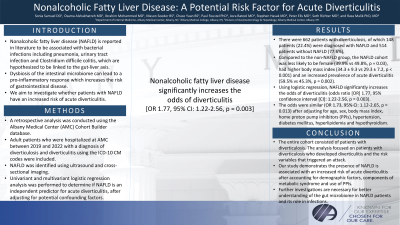Tuesday Poster Session
Category: Liver
P3773 - Nonalcoholic Fatty Liver Disease: A Potential Risk Factor for Acute Diverticulitis
Tuesday, October 24, 2023
10:30 AM - 4:00 PM PT
Location: Exhibit Hall

Has Audio

Sonia Samuel, DO
Albany Medical Center
Albany, NY
Presenting Author(s)
Sonia Samuel, DO1, Osama Alshakhatreh, MD1, Ibrahim Mohammed, MD1, Mason Soeder, BS1, Chase Yuan, BS1, Paul Feustel, PhD1, Asra Batool, MD1, Stephen Hasak, MD, MPH2, Peter Ells, MD1, Seth Richter, MD1, Raza Malik, MD, PhD1
1Albany Medical Center, Albany, NY; 2Albany Medical College, Albany, NY
Introduction: Nonalcoholic fatty liver disease (NAFLD) is reported in literature to be associated with bacterial infections including pneumonia, urinary tract infection and Clostridium difficile colitis, which are hypothesized to be linked to the gut-liver axis. Dysbiosis of the intestinal microbiome can lead to a pro-inflammatory response which increases the risk of gastrointestinal disease. We aim to investigate whether patients with NAFLD have an increased risk of acute diverticulitis.
Methods: A retrospective analysis was conducted using the Albany Medical Center (AMC) Cohort Builder database. Adult patients who were hospitalized at AMC between 2019 and 2022 with a diagnosis of diverticulosis and diverticulitis using the ICD-10 CM codes were included. NAFLD was identified using ultrasound and cross-sectional imaging. Univariant and multivariant logistic regression analysis was performed to determine if NAFLD is an independent predictor for acute diverticulitis, after adjusting for potential confounding factors.
Results: There were 662 patients with diverticulosis, of which 148 patients (22.4%) were diagnosed with NAFLD and 514 patients without NAFLD (77.6%). Compared to the non-NAFLD group, the NAFLD cohort was less likely to be female (39.9% vs 49.8%, p = 0.03), had higher body mass index (34.3 ± 9.3 vs 29.3 ± 7.2, p < 0.001) and an increased prevalence of acute diverticulitis (59.5% vs 45.3%, p = 0.002). Using logistic regression, NAFLD significantly increases the odds of diverticulitis (odds ratio [OR] 1.77, 95% confidence interval [CI]: 1.22-2.56, p = 0.003). The odds were similar (OR 1.73, 95% CI: 1.12-2.65, p = 0.013) after adjusting for age, sex, body mass index, home proton pump inhibitors (PPIs), hypertension, diabetes mellitus, hyperlipidemia and hypothyroidism.
Discussion: The entire cohort consisted of patients with diverticulosis. The analysis focused on patients with diverticulosis who developed diverticulitis and the risk variables that triggered an attack. Our study demonstrates the presence of NAFLD is associated with an increased risk of acute diverticulitis after accounting for demographic factors, components of metabolic syndrome and use of PPIs. Further investigations are necessary for better understanding of the gut microbiome in NAFLD patients and its role in infections.
Disclosures:
Sonia Samuel, DO1, Osama Alshakhatreh, MD1, Ibrahim Mohammed, MD1, Mason Soeder, BS1, Chase Yuan, BS1, Paul Feustel, PhD1, Asra Batool, MD1, Stephen Hasak, MD, MPH2, Peter Ells, MD1, Seth Richter, MD1, Raza Malik, MD, PhD1. P3773 - Nonalcoholic Fatty Liver Disease: A Potential Risk Factor for Acute Diverticulitis, ACG 2023 Annual Scientific Meeting Abstracts. Vancouver, BC, Canada: American College of Gastroenterology.
1Albany Medical Center, Albany, NY; 2Albany Medical College, Albany, NY
Introduction: Nonalcoholic fatty liver disease (NAFLD) is reported in literature to be associated with bacterial infections including pneumonia, urinary tract infection and Clostridium difficile colitis, which are hypothesized to be linked to the gut-liver axis. Dysbiosis of the intestinal microbiome can lead to a pro-inflammatory response which increases the risk of gastrointestinal disease. We aim to investigate whether patients with NAFLD have an increased risk of acute diverticulitis.
Methods: A retrospective analysis was conducted using the Albany Medical Center (AMC) Cohort Builder database. Adult patients who were hospitalized at AMC between 2019 and 2022 with a diagnosis of diverticulosis and diverticulitis using the ICD-10 CM codes were included. NAFLD was identified using ultrasound and cross-sectional imaging. Univariant and multivariant logistic regression analysis was performed to determine if NAFLD is an independent predictor for acute diverticulitis, after adjusting for potential confounding factors.
Results: There were 662 patients with diverticulosis, of which 148 patients (22.4%) were diagnosed with NAFLD and 514 patients without NAFLD (77.6%). Compared to the non-NAFLD group, the NAFLD cohort was less likely to be female (39.9% vs 49.8%, p = 0.03), had higher body mass index (34.3 ± 9.3 vs 29.3 ± 7.2, p < 0.001) and an increased prevalence of acute diverticulitis (59.5% vs 45.3%, p = 0.002). Using logistic regression, NAFLD significantly increases the odds of diverticulitis (odds ratio [OR] 1.77, 95% confidence interval [CI]: 1.22-2.56, p = 0.003). The odds were similar (OR 1.73, 95% CI: 1.12-2.65, p = 0.013) after adjusting for age, sex, body mass index, home proton pump inhibitors (PPIs), hypertension, diabetes mellitus, hyperlipidemia and hypothyroidism.
Discussion: The entire cohort consisted of patients with diverticulosis. The analysis focused on patients with diverticulosis who developed diverticulitis and the risk variables that triggered an attack. Our study demonstrates the presence of NAFLD is associated with an increased risk of acute diverticulitis after accounting for demographic factors, components of metabolic syndrome and use of PPIs. Further investigations are necessary for better understanding of the gut microbiome in NAFLD patients and its role in infections.
Disclosures:
Sonia Samuel indicated no relevant financial relationships.
Osama Alshakhatreh indicated no relevant financial relationships.
Ibrahim Mohammed indicated no relevant financial relationships.
Mason Soeder indicated no relevant financial relationships.
Chase Yuan indicated no relevant financial relationships.
Paul Feustel indicated no relevant financial relationships.
Asra Batool indicated no relevant financial relationships.
Stephen Hasak indicated no relevant financial relationships.
Peter Ells indicated no relevant financial relationships.
Seth Richter indicated no relevant financial relationships.
Raza Malik indicated no relevant financial relationships.
Sonia Samuel, DO1, Osama Alshakhatreh, MD1, Ibrahim Mohammed, MD1, Mason Soeder, BS1, Chase Yuan, BS1, Paul Feustel, PhD1, Asra Batool, MD1, Stephen Hasak, MD, MPH2, Peter Ells, MD1, Seth Richter, MD1, Raza Malik, MD, PhD1. P3773 - Nonalcoholic Fatty Liver Disease: A Potential Risk Factor for Acute Diverticulitis, ACG 2023 Annual Scientific Meeting Abstracts. Vancouver, BC, Canada: American College of Gastroenterology.
